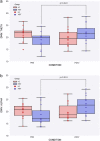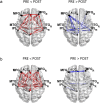Effects of an Online Mind-Body Training Program on the Default Mode Network: An EEG Functional Connectivity Study
- PMID: 30446714
- PMCID: PMC6240056
- DOI: 10.1038/s41598-018-34947-x
Effects of an Online Mind-Body Training Program on the Default Mode Network: An EEG Functional Connectivity Study
Abstract
Online mind-body training (MBT) programs can improve the psychological capabilities of practitioners. Although there has been a lot of effort to understand the neural mechanisms underlying the therapeutic effects of meditation, little is known about changes in electroencephalographic (EEG) functional connectivity that accompany mind-body training. The present study aimed to investigate how an online MBT program alters EEG functional connectivity in the default mode network (DMN). We assessed a group of healthcare providers, including 14 females who participated in the 4-week MBT program and 15 females who underwent a 4-week of waiting period. EEG data and information about psychological states were obtained at baseline and 4 weeks. The result was that the intervention group showed significant reductions in anxiety and trait anger that were accompanied by increased global DMN network strengths in the theta and alpha (but not beta and delta) frequency bands; these changes were not observed in the control group. Other variables including state anger, positive and negative affect, and self-esteem have not been changed over time in both groups. These findings suggest that practicing the mind-body training could have a relevance to the functional differences in network related to stress and anxiety reaction.
Conflict of interest statement
The authors declare no competing interests.
Figures



Similar articles
-
Long-term beneficial effects of an online mind-body training program on stress and psychological outcomes in female healthcare providers: A non-randomized controlled study.Medicine (Baltimore). 2020 Aug 7;99(32):e21027. doi: 10.1097/MD.0000000000021027. Medicine (Baltimore). 2020. PMID: 32769863 Free PMC article. Clinical Trial.
-
Default mode network alterations in individuals with high-trait-anxiety: An EEG functional connectivity study.J Affect Disord. 2019 Mar 1;246:611-618. doi: 10.1016/j.jad.2018.12.071. Epub 2018 Dec 24. J Affect Disord. 2019. PMID: 30605880
-
Studying the default mode and its mindfulness-induced changes using EEG functional connectivity.Soc Cogn Affect Neurosci. 2014 Oct;9(10):1616-24. doi: 10.1093/scan/nst153. Epub 2013 Nov 4. Soc Cogn Affect Neurosci. 2014. PMID: 24194576 Free PMC article.
-
Alpha/Theta Neurofeedback Increases Mentalization and Default Mode Network Connectivity in a Non-Clinical Sample.Brain Topogr. 2017 Nov;30(6):822-831. doi: 10.1007/s10548-017-0593-8. Epub 2017 Sep 21. Brain Topogr. 2017. PMID: 28936792 Clinical Trial.
-
Electroencephalography theta/beta ratio covaries with mind wandering and functional connectivity in the executive control network.Ann N Y Acad Sci. 2019 Sep;1452(1):52-64. doi: 10.1111/nyas.14180. Epub 2019 Jul 16. Ann N Y Acad Sci. 2019. PMID: 31310007 Free PMC article.
Cited by
-
A Critical Analysis on Characterizing the Meditation Experience Through the Electroencephalogram.Front Syst Neurosci. 2020 Aug 7;14:53. doi: 10.3389/fnsys.2020.00053. eCollection 2020. Front Syst Neurosci. 2020. PMID: 32848645 Free PMC article. Review.
-
Breath-Body-Mind Core Techniques to Manage Medical Student Stress.J Med Educ Curric Dev. 2023 Nov 9;10:23821205231212056. doi: 10.1177/23821205231212056. eCollection 2023 Jan-Dec. J Med Educ Curric Dev. 2023. PMID: 37953880 Free PMC article.
-
The BERN Framework of Mind-Body Medicine: Integrating Self-Care, Health Promotion, Resilience, and Applied Neuroscience.Front Integr Neurosci. 2022 Jul 14;16:913573. doi: 10.3389/fnint.2022.913573. eCollection 2022. Front Integr Neurosci. 2022. PMID: 35910341 Free PMC article. Review.
-
South Korean Study to Prevent Cognitive Impairment and Protect Brain Health Through Lifestyle Intervention in At-Risk Elderly People: Protocol of a Multicenter, Randomized Controlled Feasibility Trial.J Clin Neurol. 2020 Apr;16(2):292-303. doi: 10.3988/jcn.2020.16.2.292. J Clin Neurol. 2020. PMID: 32319247 Free PMC article.
-
New Evidence in the Booming Field of Online Mindfulness: An Updated Meta-analysis of Randomized Controlled Trials.JMIR Ment Health. 2021 Jul 19;8(7):e28168. doi: 10.2196/28168. JMIR Ment Health. 2021. PMID: 34279240 Free PMC article. Review.
References
-
- Garland SN, Carlson LE, Cook S, Lansdell L, Speca M. A non-randomized comparison of mindfulness-based stress reduction and healing arts programs for facilitating post-traumatic growth and spirituality in cancer outpatients. Support. Care Cancer. 2007;15:949–961. doi: 10.1007/s00520-007-0280-5. - DOI - PubMed
Publication types
MeSH terms
LinkOut - more resources
Full Text Sources

